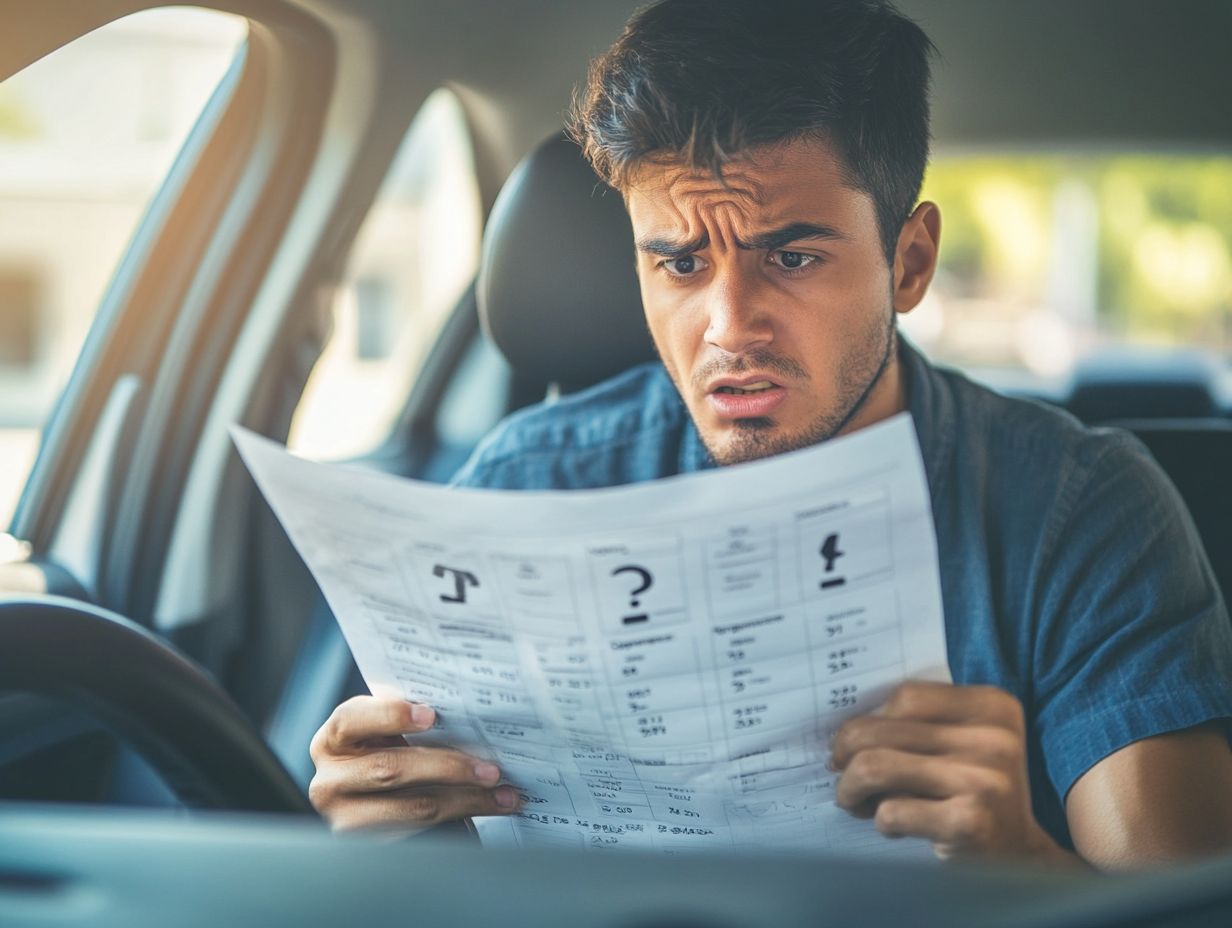5 Signs You Need to Change Your Auto Insurance
Are you feeling a bit uneasy about your current auto insurance? With rising premiums and shifting needs, it s important to know when to consider a change.
Here are five unmistakable signs that suggest it may be time to explore a new auto insurance provider. You’ll also discover key factors to consider when selecting coverage, effective strategies for saving money, and the potential pitfalls of being underinsured.
Ready to find the perfect auto insurance for your lifestyle? Read on!
Contents
- Key Takeaways:
- 1. Your Premiums Keep Increasing
- 2. Your Coverage No Longer Fits Your Needs
- 3. Poor Customer Service
- 4. Your Insurance Company Has a Bad Reputation
- 5. You Have Experienced Multiple Accidents or Violations
- What Factors Should Be Considered When Choosing Auto Insurance?
- Frequently Asked Questions
- 1. What are the signs that indicate I need to change my auto insurance?
- 2. How can I tell if my auto insurance premiums have increased?
- 3. Can changes in my driving habits affect my auto insurance needs?
- 4. How important is good customer service in auto insurance?
- 5. Why should I change my auto insurance after a major life change?
- 6. Is it worth changing my auto insurance for better coverage options?
Key Takeaways:

- Don’t overlook increasing premiums; they may be a sign to switch auto insurance providers.
- Make sure your coverage meets your current needs. Don’t pay for coverage you no longer need.
- Poor customer service is a red flag. Consider switching to a provider with better service.
1. Your Premiums Keep Increasing
If you ve noticed that your car insurance premiums are on the rise, it s probably time to reassess your current provider. Explore other options that might deliver better rates.
Common factors include recent accidents and shifts in weather patterns or crime rates. Understanding these influences can enable you to navigate the often complex insurance landscape with greater confidence.
By comparing quotes from various insurance companies, you can often uncover opportunities for lower premiums and enhanced coverage options that align with your specific needs.
Remember, the quality of service you receive from an insurer significantly impacts your overall satisfaction. So, it s vital to think about not just the pricing but also the responsiveness and support levels offered by different providers.
2. Your Coverage No Longer Fits Your Needs
As your life evolves, it s likely that your auto insurance coverage may no longer align with your needs, prompting the necessity for an updated policy that offers full coverage tailored to your current situation.
This becomes particularly relevant when significant changes arise, such as acquiring a new vehicle or making adjustments in your household perhaps welcoming a new family member or relocating to a different area. Each of these transitions introduces unique risks and responsibilities, making it essential to check your coverage limits.
Also, exploring other providers might reveal better offerings that resonate with your current lifestyle, often leading to enhanced benefits and more competitive rates.
3. Poor Customer Service
Experiencing subpar customer service from your insurance provider can significantly affect your overall satisfaction, complicating the already intricate process of handling insurance claims.
This can lead to frustration, prolonged resolutions, and a nagging sense of being undervalued as a customer. In an industry where claims and inquiries often carry time-sensitive implications, the quality of customer service becomes a pivotal factor in enhancing your overall experience.
When assessing an insurance provider, it s crucial to take into account aspects such as response times, the empathy exhibited by representatives, and the clarity of communication. Addressing these areas effectively can not only alleviate your concerns but also sway your decision on whether to switch car insurance providers.
Ultimately, exceptional customer service fosters trust and loyalty, ensuring that you feel confident in your coverage and well-supported throughout the claims process.
4. Your Insurance Company Has a Bad Reputation

If your insurance company has developed a reputation for subpar customer service or clumsy handling of claims, consider exploring alternative providers that genuinely prioritize customer satisfaction.
This choice can greatly impact your financial security and peace of mind. When navigating the aftermath of an auto accident or loss, the last thing you want is to wrestle with a complicated claims process alongside a company known for its inefficiency.
To make an informed decision, it is essential to investigate the track records of potential insurers. By scrutinizing how quickly they handle claims and sifting through customer feedback, you can uncover valuable insights. This research enables you to select a provider that meets your insurance needs and supports you in times of crisis.
5. You Have Experienced Multiple Accidents or Violations
Frequent accidents or violations can lead to increased insurance rates, prompting you to review your current coverage options for more affordable solutions that still meet your needs.
When in this situation, it s natural to wonder how to navigate the complexities of insurance pricing and the implications of your driving history. Understand that multiple infractions label you as high-risk, leading to higher premiums.
Fortunately, you have options to consider. Enrolling in defensive driving courses or practicing safe driving can help reduce your rates over time. By comparing quotes from various insurers, you can uncover potential discounts that might not be immediately evident, ensuring you secure the best possible coverage at a rate that fits your budget.
What Factors Should Be Considered When Choosing Auto Insurance?
When selecting auto insurance, consider several essential factors, such as coverage options, potential financial savings, and specific requirements that align with your unique circumstances and the geographical elements influencing your rates.
This involves thoroughly evaluating coverage limits and choosing the appropriate types of insurance like liability, comprehensive, and collision to ensure you have adequate protection. Your location plays a critical role; for instance, urban drivers often pay higher premiums due to increased risks, while those in rural areas may benefit from lower rates.
Compare insurance providers carefully to secure the best deals. Take the time to examine customer reviews, assess service responsiveness, and look for available discounts whether for safe driving, bundling policies, or maintaining good credit. Understanding these components can help you achieve significant financial savings and create a personalized insurance plan that adapts to your evolving needs.
How Can You Save Money on Auto Insurance?
You can save money on auto insurance with a few smart strategies. Start by taking full advantage of insurance discounts, comparing quotes, and exploring loyalty discounts offered by your provider.
Keeping a clean driving record is significant in lowering your premiums, as insurers reward safe drivers with more favorable rates. Another savvy approach is to increase your deductibles; while this might mean a bit more out-of-pocket expense in the event of a claim, it often leads to a noticeable reduction in your monthly payments.
Consider bundling your auto insurance with home insurance; this tactic can yield substantial savings since many companies offer discounts for policyholders who combine their coverage. Lastly, make it a habit to regularly compare quotes from various providers to ensure you’re securing the best premium reduction available, particularly in today s competitive market.
Types of Auto Insurance You Should Know

Understanding the different types of auto insurance coverage is important for drivers. It helps you know the protection each policy provides, including comprehensive coverage and liability insurance.
Exploring these options can greatly affect how well you’re protected in case of an accident or unexpected events. Liability insurance helps pay for damages to others if you’re at fault, ensuring you meet your financial responsibilities.
Collision coverage helps when your car gets damaged in a crash. On the other hand, comprehensive coverage protects you against theft, vandalism, and natural disasters.
Uninsured motorist coverage is essential when the other driver doesn’t have enough insurance, allowing you to feel secure on the road.
How to Know If You Have Enough Coverage
To find out if you have enough coverage, you should review your current policy. Check your coverage limits and your specific insurance needs based on factors like vehicle value and lifestyle changes.
By examining your policy closely, you can spot any gaps in coverage, helping you to be ready for unexpected events. Consider potential personal liabilities from daily activities, such as changes in driving habits or home ownership.
Regularly reviewing your coverage limits can show if they still meet your current needs. If changes are needed, contact your insurance provider to discuss options for updating your policy. This proactive step ensures you have peace of mind and adequate protection.
Consequences of Not Having Adequate Auto Insurance
Not having enough auto insurance can lead to serious problems you can’t afford to ignore. This includes financial risks, legal penalties, and increased liability if an accident occurs.
If you’re driving without sufficient coverage, you could face hefty fines, license suspensions, or even criminal charges, depending on where you live. If an accident happens, not being able to cover damages out of pocket can create significant financial strain, leading to more debt.
Inadequate insurance makes the claims process harder, leaving you open to lawsuits that can further destabilize your finances. The consequences go beyond immediate costs, potentially affecting your future insurability and raising premium rates. You don t want to find yourself in this situation!
How to Switch to a New Auto Insurance Provider
Switching to a new auto insurance provider can be easy if you compare quotes and understand your coverage needs. Make sure to meet any specific requirements set by the new company.
Start by gathering multiple quotes from different providers. This lets you evaluate the most competitive rates available. Once you have the quotes, review each policy carefully. Pay attention to coverage limits, deductibles, and any additional benefits that could enhance your protection.
Make sure there are no gaps in coverage during the switch, as these can leave you vulnerable on the road. Familiarize yourself with the new provider’s policy terms, as they might differ from your previous plan. By being proactive and organized, you can make the transition smooth and maintain your peace of mind.
Frequently Asked Questions

1. What are the signs that indicate I need to change my auto insurance?
The following are 5 signs that you need to change your auto insurance:
- Increased premiums
- Changes in your driving habits
- Unsatisfactory customer service
- Better coverage options available
- Significant life changes
Take control of your coverage today. Contact your insurance provider to ensure you’re fully protected!
Notice a sudden spike in your monthly premiums? If your driving record and coverage needs haven’t changed, it might be time to shop for a new insurance company.
3. Can changes in my driving habits affect my auto insurance needs?
Yes! Buying a new car, moving, or using your vehicle for work can change what you need from your auto insurance.
Review your coverage to make sure it fits your current situation.
4. How important is good customer service in auto insurance?
Good customer service is crucial.
If you’re struggling to reach your insurance company or getting answers to your claims, consider finding a new provider.
5. Why should I change my auto insurance after a major life change?
Major life changes like marriage, having a child, or retirement can significantly impact your auto insurance needs.
Update your coverage immediately to ensure you re protected and not overpaying.
6. Is it worth changing my auto insurance for better coverage options?
If your current insurance company doesn t offer the options you need or has much higher premiums than others, switching may be worthwhile.
Regularly reviewing your coverage helps ensure you re getting the best value!






